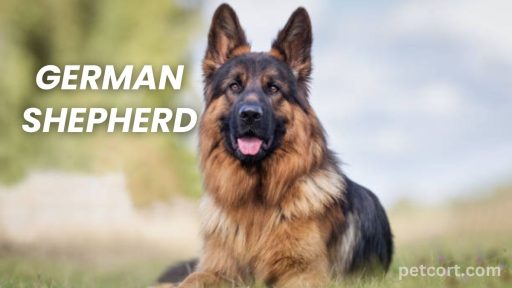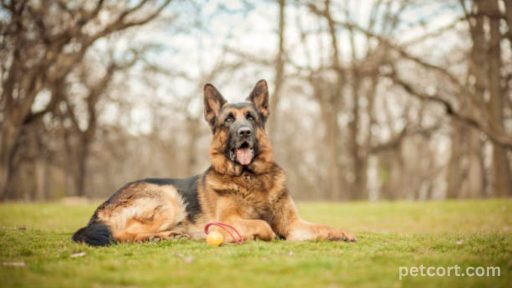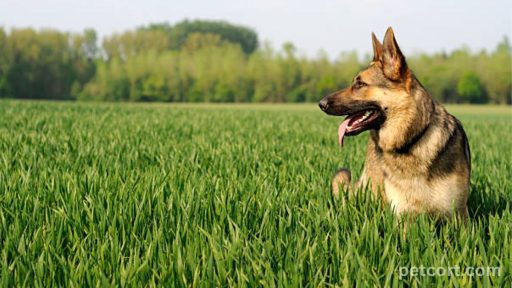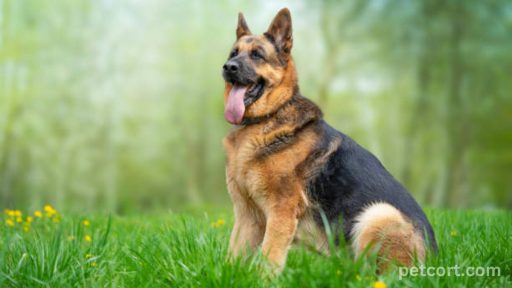German Shepherd is one of the most popular dog breeds. Their intelligence, loyalty, and athleticism make them excellent companions, working dogs, and family pets.
However, misinformation about the breed abounds. This concise beginner’s guide provides accurate information to help you decide if a German Shepherd is right for you and to assist in choosing and caring for one.

In the following chapters, readers will learn about the German Shepherd’s origins, typical temperament, health considerations, nutritional needs, grooming and training requirements, exercise needs, and the different breed types.
Additional tips cover finding a responsible breeder, preparing your home, and debunking myths. When properly raised and trained, German Shepherds are outstanding companions.
German Shepherds are big, intelligent dogs that can be great family pets. This guide will teach you all about this breed so you can decide if a German Shepherd is the right dog for you!
Contents
History of German Shepherds
- Originally bred to herd sheep in Germany
- They are used as military and police dogs because they’re intelligent, loyal, and brave
- Make good guide dogs and search and rescue dogs, too
Where German Shepherds Come From
German Shepherds first came from Germany in 1899. Max von Stephanitz bred a dog named Hektor to be intelligent, obedient, and good at herding sheep. He called the new breed “German Shepherd Dog.”
Timeline of Major Events for German Shepherds
| Year | Event |
| 1899 | German Shepherds first bred by Max von Stephanitz in Germany |
| 1900-1930s | Became popular military and police dogs in Germany and elsewhere |
| 1950s | Still, popular pets, show dogs, and working dogs around the world |
| Today | Still popular pets, show dogs, and working dogs around the world |
German Shepherd Characteristics
- Medium to large-sized dogs
- Known for black and tan coloring
- Pointy ears stand up on their heads
- Long muzzles and strong jaws
- The bushy tail often hangs down
Appearance
German Shepherds are medium to large dogs standing 22-26 inches tall at their shoulders. They have a noble and alert look, with their pointy ears sticking straight up from their heads. Most German Shepherds have black “masks” on their faces and black and tan coloring on their bodies, but some colors, like all black or white, are also allowed. They have long muzzles for strong bites and bushy tails that hang down.
German Shepherd Features
| Feature | 22-26 inches tall at the shoulder when grown |
| Size | Black and tan are most common, but all black, white, and sable also allowed |
| Weight | 50-90 pounds when grown |
| Coat | Thick double-layered fur |
| Coloring | Bushy tail hangs down |
| Ears | Large, pointed ears stand erect |
| Head | Long rectangular muzzle, strong jaws |
| Tail | Bushy tail, hangs down |
You May Also Like:
American Bulldog Dog Breed Info
Smart and Loyal Personality
German Shepherds are best known for being brilliant dogs. They are easy to train because they love to learn and listen closely to directions. With proper training, they can learn almost anything! German Shepherds form very close bonds with their owners.
They are loyal and want to please the people they love. Since they’re protective of their families, they make excellent watchdogs, too. As puppies, German Shepherds like to chew and can be energetic. But with age, they calm down and focus intently on tasks.

Keeping German Shepherds Healthy
- Prone to joint disorders like hip dysplasia
- May develop digestive problems or skin allergies
- Need lots of exercise and mental stimulation
German Shepherds tend to have long lifespans of 10-14 years. But particular health conditions can arise, so feeding them nutritious food and taking them to the vet for regular checkups is essential.
Nutrition
German Shepherds need high-quality dog food with meat protein as the main ingredient. This gives them energy and helps their joints stay healthy. Avoid cheap brands that can upset their sensitive digestive systems.
Don’t overfeed German Shepherd puppies, even though it might seem like they’re always hungry. Obesity will put extra pressure on their developing joints. Feed adult German Shepherds twice daily and adjust food amounts based on activity level to keep their weight ideal.
Health Concerns
Some common health issues German Shepherds can face include:
- Hip and elbow dysplasia – causes joint pain
- Bloat – stomach twists dangerously
- Allergies – to pollen, foods, molds
- Digestive issues – acid reflux, inflammatory bowel disease
German Shepherds are at high risk for musculoskeletal conditions like hip dysplasia because they increase their large size. Careful breeding, nutrition, and exercise can help prevent problems.
Exercise Needs
German Shepherds love being active! Take them on at least two good daily walks plus active playtime in a fenced yard. Make sure to include both mental and physical exercise. Since they’re working dogs, they need jobs, or they can get bored and frustrated.
Practice obedience training, take them hiking, play fetch games, or give them a backpack to wear on walks so they have a “job” to do. A tired German Shepherd is a well-behaved German Shepherd!
Activity Guidelines for German Shepherds
| Age | Exercise Needs |
| Puppies up to 1 year | Multiple shorter play sessions per day is best for growing bones and joints |
| Adults 1-7 years | Need at least 2 hours per day of activity like walking, running, playing fetch |
| Senior 7+ years | Lower intensity exercise, like gentle walks and light play |
You May Also Like:
Golden Retriever Dog Breed Info
Training Your German Shepherd
- Eager to learn – easy to train
- Respond best to positive reinforcement
- Need early socialization with other dogs/people
German Shepherds are extremely intelligent and strongly desire to work closely with their handlers. This makes them fun and rewarding to train as they love learning new things.

Obedience
Start tеachin’ basic obеdiеncе commands likе sit and stay and an’ comе when you first bring home your German Shepherd puppy. Usе rеwards likе trеats an’ praisе to rеinforcе good bеhavior positively. Sign up for group obedience classes so your pup learns how to listen to you with other distractions. Practicing for short sessions multiple times daily is the fastest way to train a German Shepherd.
Socialization
An essential part of training is continued lifelong socialization in new places, people, animals, and situations. Gеrman Shеphеrds can be wary of strangеrs so introducing them gently to many types of people, starting as a young pup, will prevent overprotective behavior or fearfulness as an adult. Schedule regular play sessions with friends’/neighbors’ gentle, vaccinated dogs so your German Shepherd stays comfortable and friendly with other canines.

Advanced Training
Keep challenging your brilliant German Shepherd to learn new commands and behaviors their whole life. German Shepherds excel at many canine jobs and dog sports like:
- Search and rescue
- Police K9 duties
- Guide dog work
- Agility competitions
- Flyball racing
- Frisbee catching
Is a German Shepherd Right for You?
German Shepherds can make wonderful family pets if provided with proper care and training to meet their needs. Consider if you meet the ideal owner requirements below:
- Able to spend substantial time exercising daily – German Shepherds need lots of activity or can become bored and destructive.
- Committed to lifelong training and mental stimulation – Their intelligence requires ongoing learning opportunities and “jobs” to be happy.
- Have a securely fenced yard – German Shepherds should not be left unattended in unsecured spaces, or they may roam due to protectiveness or curiosity.
- They can afford expenses for quality food, supplies, vet care, and training costs. Their size, healthcare needs, etc., entail higher costs than small breeds.
- Prepare to groom frequently – German Shepherds shed year-round and need weekly brushing, nail trims, and teeth cleaning.
If this sounds like you and your family, then an intelligent, eager-to-please German Shepherd will likely make an excellent, loving pet in your home for years to come!
You May Also Like:
Labrador Retriever Dog Breed Info
Conclusion
German Shepherds are legendary dogs for many great reasons. They make wonderfully loyal pets and steadfast lifelong companions when provided the proper training, activity, socialization, and TLC.
Their athleticism, intelligence, and eagerness to work make owning a German Shepherd an enriching experience. If you can meet their needs for exercise, mental stimulation, a healthy diet, and quality vet care, then a German Shepherd may be the perfect addition to your family!
Frequently Asked Questions
Yes! German Shepherds bond closely with all household members and tend to be especially protective of children. They can peacefully coexist with other pets, too, when adequately socialized. Their intelligence makes training more accessible than many breeds.
Yes, German Shepherds have a double coat that sheds year-round. Expect lots of hair and plan to brush them weekly, plus regular bathing and grooming. They are shedding increases heavily during seasonal “blowing coat” periods.
German Shepherd puppies are eager to learn and highly responsive to training that uses positive reinforcement techniques. Their innate working abilities mean they excel at obedience work, tricks, tracking, or athletic feats. Lifelong socialization is an essential component, too, for a well-adjusted dog.
German Shepherds need a good 1-2 hours of exercise per day. This energetic breed should have two brisk daily walks plus time to run around safely in a yard. Fetch, tug of war, obstacle courses, and other interactive games help meet their needs best. German Shepherds may become anxious or bored without adequate activity, leading to destructive chewing behaviors.
Hip and elbow dysplasia are common joint diseases seen in German Shepherds. Digestive issues like bloat or inflammatory bowel disease can also occur. Allergies, eye conditions, skin problems, and autoimmune disorders are some other health issues they can be prone to. Buying from reputable breeders and maintaining vet checkups helps to catch any genetic conditions early.
Share Your Friends





